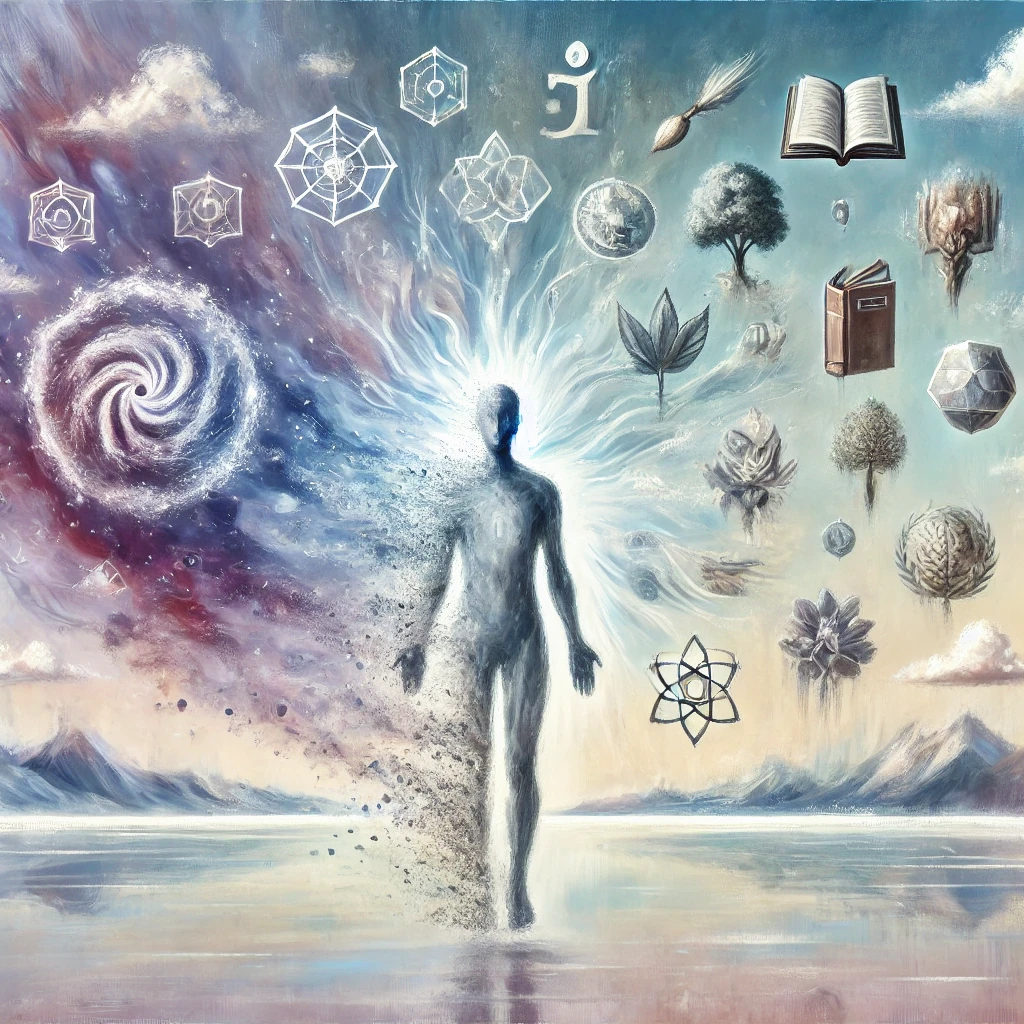Complete, utmost awareness of the presence is fondly prescribed by motivational speakers as the best way of life, both for observing and absorbing. We all know of it. However, will that kind of heightened awareness allow one to separate ‘I’ from ‘now’?
Tuning the mind regularly over a period of time makes it possible, I think. I know many who evolved that way, some of them without even realising it. Human minds, after all, are tameable like pets, with regular habits, aren’t they?
What counts, though, is, do I want to intentionally remove ‘I’ from ‘now’, off and on? How frequently? For what duration? And what can it do to the human mind? Exploring more on the pros and cons might perhaps help us understand it better.
Most of us follow it most of the time, only at different levels, at different frequencies, and also in different ways.
Removing ‘I’ out of ‘now’ can bring amazingly profound experiences in unfamiliar lands, totally new cultures, new places, books, genres, and new workplaces because we become the other. We see things clearly, as they are. Unassumingly, we lose ourselves to another world, albeit momentarily, therefore becoming effectively creative, more empathetic, and also creating refreshing memories. It helps fiction writers like me in shaping more credible characters because we allow ourselves to be out of our familiar space.
The clarity in thought that something unpleasant to one can be interesting to another and that the difference need not necessarily deter the association or friendship between the two can come only with genuine empathy, the result of becoming the other, forgetting self.
Generally speaking, I think those who are open to considering new ideas and concepts are going to find it easier and might even start loving it instantly. Those unable to pull themselves out of their comfortable enclosures might take longer but arrive there, anyway.
Are we going to also consider ‘relatability’, ‘the connect’ as book reviewers utter? Many readers stop reading a book when they can’t ‘relate’ to the fiction. Isn’t reading supposed to bring all the unknown spaces and perspectives so as to expand, enhance, and enrich our intellect and hence also our experience?
If ‘knowing’ happens only to match the ‘already known’, is it even ‘knowing’ in the first place? For more effective reading, especially fiction, the ‘already known’ should at least take a back seat, even if it cannot vanish completely. And that can happen only if I can shun my ‘I’.
A person who is always open to new ideas is often mistaken for being indecisive. Surrendering naturally to the setting that can possibly allow observation is often times understood wrongly.
Whenever I discuss the topic of stepping back to observe, “Easier to say, Ms. Jay,” my younger friends, mentees, and colleagues would comment, sadly, sarcastically, or cynically. “Isn’t it too idealistic? Think about it, when my life is a tsunami, do you expect me to sit and watch?” No, I wouldn’t.
It’s strange how brutally paradoxical life tends to be, right?
Removing ‘I’ out of ‘now’ might come a little easier when one manages to leave the situation, but wouldn’t it be perceived as indifference, insensitivity, or escapism? That, of course, depends largely on the context and the mindset.
We also get other context-specific questions like, when I’m out of ‘now’, then who really is experiencing the moment? Will the memories really be mine?
There are quite a number of folks, especially brilliant readers, who have been able to consciously practice ‘I’ out of ‘now’. Probably without awareness. I know some of my younger friends who are enviably brilliant readers, yet, when it comes to their real lives, they are unable to step back to see the sufferings the formidable life slaps on their faces.
If you ask me when it began in me, I wouldn’t have an answer because I honestly don’t know or remember. Except perhaps—I’ve been in that state of mind since young. And if you ask me when I knew about it, I wouldn’t have a concrete answer either because I didn’t even know that I had it embedded in me until people pointed it out to me around my post teen years. I’ve reflected a lot on the root of it.
My late father, a central government civil engineer, used to be transferred every few years to various states across India, where I was born and brought up. He was posted to a rural interior of Odisha. There were no proper schooling facilities in the Dhandakaranya project site. My parents had to make the painful decision of leaving my sister and me with my paternal uncle’s family. We were 5–6 years old. Despite all the conducive care and family-friendly environment provided, I used to constantly think of my parents. I felt completely lost. Unlike my sister, who managed to sail through smoothly, I, an introvert, suffered insecurities in silence.
Later, when we were back with our parents, I was not the person I used to be two years before. My two brothers were born within the next two years. I constantly wished for my parents’ happiness and peace of mind. At that age, I must have thought that if I behaved well, they wouldn’t think of separating me from them. I was determined to never cause them the slightest anguish. Being the first child, I took it upon myself to do all that I could to ensure that my mother got sufficient help she needed in maintaining the house, meeting my brothers’ needs, and completing the chores. I did as much of the chores as I could. At that tender age, it was my way of contributing to my mother’s comfort. To the extent that I forgot I was still a child and that I needed to play and jump around.
Parents got so busy with life that they weren’t even aware of the fears of insecurity I’d carried in me.
My thoughts were focused entirely on my mother’s and my father’s well-being. I used to fill my heart with only their thoughts and needs. I had nothing else on my mind. I derived happiness from theirs and sadness from theirs. I hadn’t any of my own. I realised all of these only as I grew up. Caring for others became my fibre and remains the same, till today.
Interestingly, quite a number of people have sensed and highlighted my innate ability to step back from my issues. I came to realise it more as life moved me forward.
And hold it right there! There is a flip side to this, I discovered on hind sight.
I became unimaginably empathetic towards others around me. Not only to the near and dear, but also to total strangers. I got instantly and intensely affected. Even sad news on paper affected me. Movies made me forget that I was only watching a show and that I’m an individual. I’ve shamelessly bawled aloud all of a sudden, unaware of the surroundings while reading a novel or watching a movie.
I was more often mistaken for being weak-hearted, even branded as a ‘crybaby’. At other times, I was known to be a natural giver. I grew stronger, though slowly, at heart, which only I knew.
When I began to read seriously during my mid-twenties, novels completely threw me out of my reality so much that I lived in the imaginary world a lot more than I lived in reality because I read a lot.
I could easily step back to see my life objectively. At the same time, I felt intensely the pains and sufferings of others, known and unknown. Overly so. I feared constantly that I might witness the suffering of someone around me, not caring about my sufferings. Strange, isn’t it?
Stepping back to observe my life challenges comes as easily and involuntarily as breathing to me, but I just can’t do the same when I see others’, and this remains a major challenge I face, till date. Also, a mystery.
At 60, I’m able to sit calmly and reminisce about the journey of how I had to teach myself to protect myself better. Balancing empathy and self-protection hasn’t been easy for me. The former mostly overpowers the latter in me, and I’ve always had to consistently struggle to strike a balance.
I’ve been able to manage my high sensitivity towards others’ emotions and pains, but only to a certain level. All that I’ve been able to do to my overpowering empathy is to build on my resilience, grateful to the universe for that little wisdom. I cultivated the habit of pushing myself to other stuff waiting for my attention, to get over.
That’s exactly how I got over the sleepless consecutive nights when I got to know of the heartbreaking stories of migrant workers for the first few months of my job. It was depressing to hear them all day, especially for the person that I am. I’ve had to work hard at bringing a balance between my high empathy and low self-care. Now, I’m able to stay composed and ask workers additional questions to understand more so they get help.
We know another common kind—habitually, joyfully, sometimes depressingly, or at times toxically brings ‘self’ into anything and everything. I hope to touch on ‘self obsession’ leading to own and others’ unhappiness, but some time later.
Does ‘I’ out of ‘now’, come under any meditative technique or as a byproduct of the process in spiritual practices is yet another question that branches out, especially because there is a school of thought that says spiritual progress in a person should rightfully diminish his creativity. Worth exploring?



Your blog like you has extended an empathetic helping hand towards me. Your wisdom isn’t preachy but guiding. With this blog, I feel I know you a little more, but there is so much to discover. Keep writing more of such blogs so that your words become our guiding light.
1.The self protective survival instinct essentially inherent blessing. But, it’s subjective. The negativity and lack of empathy around is overwhelming. It is scary for a sensitive mind in spite of co-existing with the desert-like environment.
2.’there is a school of thought that says spiritual progress in a person should rightfully diminish his creativity. Worth exploring? ‘- Creative arena revolves around illusion and permanence of all that is transient. The irony is- fiction and poetry touch all real, illusory real and our pursuit of all mirages alike. But spirituality excludes illusion. My aborted as well as misconceived notion of spirituality are potent with innumerable themes and sparks for creation. Creation can depict a successful spiritual pursuit or all misunderstandings about spirituality. Life of my fellow beings pulsates inhaling and exhaling illusions. Aren’t all my works woven around them?